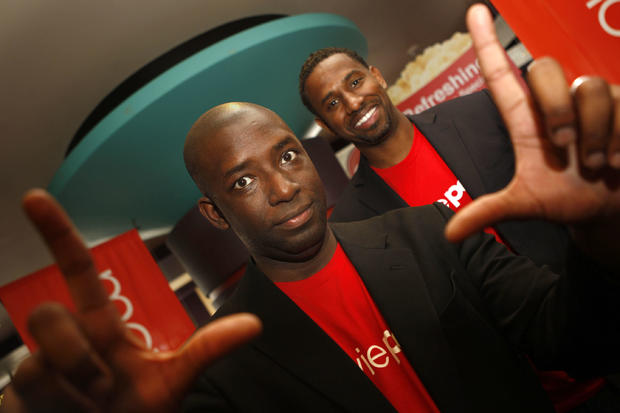MoviePass relaunching with ad service that tracks your eyeballs
Two years after going bankrupt, MoviePass is being reborn.
Instead of allowing users to watch unlimited films for $10 a month — a business model that drew customers but failed to yield profits — the new MoviePass will offer a tiered service, with movies costing "credits" based on their popularity and screening time. Another twist: When the service relaunches this summer, subscribers will be able to earn credits by watching ads on their phone — provided they allow the software to track their eye movements to ensure they're watching the ads.
MoviePass founder Stacy Spikes laid out his vision for the ad-watching service at an event last week at New York City's Lincoln Center. Spikes, who previously raised $56,000 on Kickstarter for the ad-watching program, dubbed PreShow, pitched it as a way for viewers to cash in on their ad consumption in exchange for free films. According to Spikes, the spots on PreShow are just like ads that play before a movie in theaters, but personalized based on the viewer's interests.
"It basically creates a transaction between you and the brand," he said, adding, "What's cool about this is your phone, your device, uses your own facial detection."
Spikes demonstrated the software by watching an ad for a taxi service that detected when he turned away and paused the ad until he returned. That approach prevents moviegoers from cheating the system, he explained.
"We had an earlier version of this, where — you know what happened — people put the phone down, left, didn't pay any attention to it," he said.
According to a spokesperson representing MoviePass, the ad-watching software will work on any phone with a camera. The company has not yet shared details on how much it will charge for its new service.
"I love product placement"
Given that the vast majority of video viewers choose to skip ads, it's not clear how many moviegoers will subject themselves to ads in exchange for free flicks. But to hear Spikes' pitch, the software will have at least one enthusiastic user: himself.
"I love product placement in movies. I love the cars, I love the watches, I love the clothes," he told the audience Thursday. "I sometimes have a notepad and I'm writing down, 'Is that Hugo Boss?' and I'm on the computer trying to figure out, what suit is he wearing? I'm that guy."
According to Spikes, PreShow is a natural extension of advertising in movies, an industry that rakes in tens of billions of dollars every year. He also argued that, because moviegoers could opt into the program, they benefitted from it directly.
"It takes the middleman out, versus people selling your data and giving away information for you to have access to things. We're going to empower that that happens directly to you," he said.
In and out of bankruptcy
MoviePass launched in 2011 and grew slowly for half a decade. In 2017, it was acquired by Helios and Matheson Analytics, a data firm. The new owners dropped MoviePass' monthly subscription fee to bargain-basement $10 a month in a bid to grow its membership.
The move worked. In a few months, MoviePass had 1 million subscribers, and a year later it hit 3 million. What that strategy didn't do was churn out profits. MoviePass tried raising the price and putting restrictions on what members could see, but by then it had burned through most of its cash. It filed for bankruptcy protection in 2020.
Late last year, Spikes bought his company back for just $14,000, according to the Wall Street Journal. Spikes' goal, which he admits is a "moonshot," is to enroll 30% of American moviegoers into MoviePass by 2030. For now, he has at least 200 users: The attendees at Thursday's announcement each received a free yearlong subscription.




